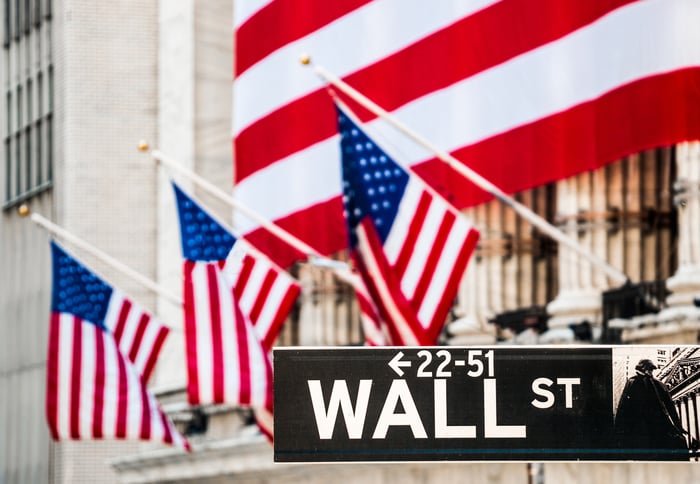For the past 127 years, the iconic Dow Jones Industrial Average (^DJI 0.40%) has served as a leading barometer of Wall Street's health. What was once an index dominated by a dozen industrial companies in the late 19th century has evolved into a 30-component index comprised of diverse, time-tested, multinational businesses.
Although the share-price-weighted Dow Jones managed to climb to a fresh all-time high in late 2023, the outlook for its 30 components varies quite a bit in the new year. Whereas two Dow stocks stand out as phenomenal buys in 2024, another long-tenured component can be easily passed up by investors.

Image source: Getty Images.
Dow stock No. 1 to buy hand over fist in 2024: Walt Disney
The first no-brainer Dow Jones stock that's begging to be bought in the new year is media giant Walt Disney (DIS -0.04%).
There's no sugarcoating the fact that Walt Disney has faced a flurry of headwinds over the past couple of years. The COVID-19 pandemic severely hampered its theme-park operations and film entertainment division. Meanwhile, large operating losses from the company's streaming services segment, coupled with weaker ad spending, has led to a challenging environment for the "House of Mouse." However, many of these gray clouds should clear in 2024, paving the way for a rebound in Disney stock.
In December 2022, China ended its controversial "zero-COVID" mitigation strategy, which involved stringent and unpredictable lockdowns. With China's economy still ramping up following years of lockdowns, Walt Disney has seen its theme-park sales growth return to normal. The further we move past the worst of the pandemic, the easier it'll be for investors to recognize that Disney's organic growth machine is back on track.
One of the key factors that powers Walt Disney's revenue and profit growth is its phenomenal pricing power. For instance, the admission price to Disneyland in Southern California has risen by more than 10,000% since the park opened in 1955. This is about 10 times higher than the aggregate rate of inflation for the U.S. economy over the same period.
Walt Disney's incredible pricing power is a reflection of the irreplaceability of its characters, storytelling, and engagement. There are plenty of other theme parks to attend and movies to watch, but no other media company has the ability to cross generational gaps with ease to allow grandparents and grandchildren to find common ground through imagination. This competitive advantage that Disney brings to the table is priceless.
Another reason to be excited about Walt Disney's prospects in 2024 is the expected operating improvement of its streaming segment. The company hasn't been shy about increasing subscription prices across most tiers.
Since Disney+ subscribers tend to be loyal to the brand, it's seen only minimal subscriber attrition as it's increased prices. When combined with mindful cost-cutting, Disney's streaming segment is capable of delivering a profit by the end of the current fiscal year (Disney's fiscal year usually ends in late September).
Walt Disney shares can be scooped up right now for 17 times forward-year earnings, which remains a bargain, considering its expected annualized earnings growth rate of 17% over the next five years.
Dow stock No. 2 to buy hand over fist in 2024: Johnson & Johnson
The second Dow stock that investors can confidently buy hand over fist in 2024 is healthcare conglomerate Johnson & Johnson (JNJ -0.46%), which is better known as "J&J."
While the Dow Jones Industrial Average was setting new highs in 2023, J&J was weighing it down. The reason for its underperformance over the past year has to do with outstanding litigation concerning its now-discontinued talc-based baby powder.
Johnson & Johnson attempted to settle the matter on two occasions last year, with the latest settlement totaling $8.9 billion. However, both attempts were eventually thrown out in court. The unknowns surrounding any financial liability for J&J clearly are holding down its shares.
The flip side to the above headwind is that Johnson & Johnson is one of only two publicly traded companies to sport a AAA-credit rating from Standard & Poor's (S&P), a division of the more-familiar S&P Global. This credit rating, which is a notch higher than the AA-credit rating bestowed on the U.S. government, signifies S&P's utmost faith that J&J can service and repay its outstanding debts.
J&J has more than $23 billion in cash, cash equivalents, and marketable securities on its balance sheet as of Oct. 1, 2023. It's also raking in north of $20 billion in operating cash flow over the trailing 12 months. Therefore, there's little worry about the company's potential financial liability.
What makes Johnson & Johnson such a screaming buy is its ongoing shift to pharmaceuticals. For more than a decade, the company has been laser-focused on expanding its novel-drug portfolio. Even though brand-name drugs have finite periods of sales exclusivity, they provide J&J with juicy margins and strong pricing power. Aggressively investing in novel research and collaborations has the company's profit needle pointing decisively higher.
As I've previously pointed out, continuity at key leadership positions is also important. You can count on two hands how many CEOs J&J has had since its founding in 1886. Minimal turnover at the top means strategic initiatives are being successfully implemented over long periods.
Finally, the price is right with Johnson & Johnson. Opportunistic long-term investors can scoop up shares of J&J for about 15 times forward-year earnings. This represents its lowest forward-year earnings multiple in at least a decade.

Image source: Getty Images.
The Dow stock to avoid like the plague in the new year: Boeing
On the other hand, commercial airplane manufacturer and defense contractor Boeing (BA 0.25%) has given investors every reason to steer clear of its stock in 2024.
On paper, Boeing has a pretty clear runway for growth. Production of the 737 MAX is forecast to expand from a current 38 aircraft per month to 50 per month by 2026. Increasing production should lift the company's operating cash flow and give it an opportunity to meaningfully chisel away at its outstanding debt.
Furthermore, the price of oil remains elevated due to tight global supply. The longer energy commodity costs remain above historic norms, the more likely commercial airlines are to upgrade their fleets to more fuel-efficient jetliners.
Over the next five to 10 years, Boeing could deliver handsomely for its shareholders. But in 2024, it has the potential to be a disaster.
Boeing is receiving a lot of attention at the moment due to an incident that occurred this past weekend involving a 737 MAX 9 jetliner that had a section of its fuselage rip off from the plane during flight. This incident, by itself, and the subsequent grounding of other 737 MAX 9 jetliners, isn't why I'd avoid Boeing stock in 2024. However, it's one of a number of instances of Boeing's next-generation aircraft running into production/quality issues. These persistent problems have slowed the production ramp up of Boeing next-gen jetliners and given investors little reason to expect a turnaround in the short term.
Boeing's missteps can also be tangibly seen in Wall Street's consensus earnings forecast for the company. At this time last year, Wall Street had been expecting north of $2 in earnings per share (EPS) for 2023. When Boeing reports its fourth-quarter operating results, expectations are that it'll close out 2023 with a full-year loss of greater than $6 per share. That's effectively a $5 billion swing lower in the company's bottom line -- yet shares of Boeing are up over the trailing year.
Another reason to avoid Boeing in the current year is its performance during recessions. Though U.S. unemployment data isn't indicative of a recession, a couple of money-based metrics and forecasting tools strongly suggest a deflationary downturn for the U.S. economy is around the corner. Boeing has historically been one of the worst-performing S&P 500 components during the past five recessions.
In a stock-picker's market, where valuation matters, buying shares of Boeing at 57 times forward-year earnings doesn't make sense.





